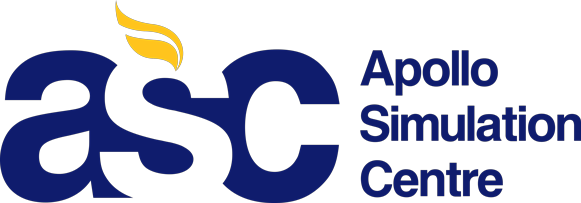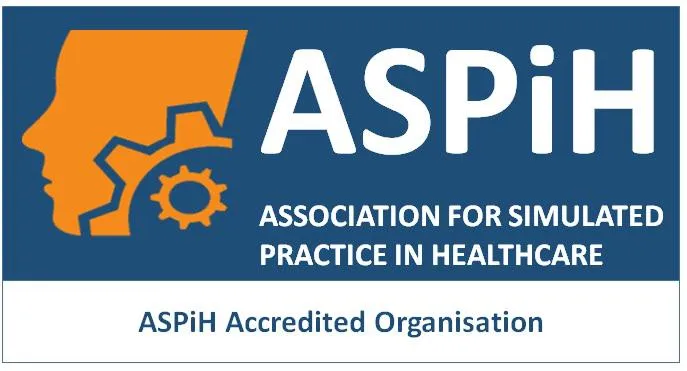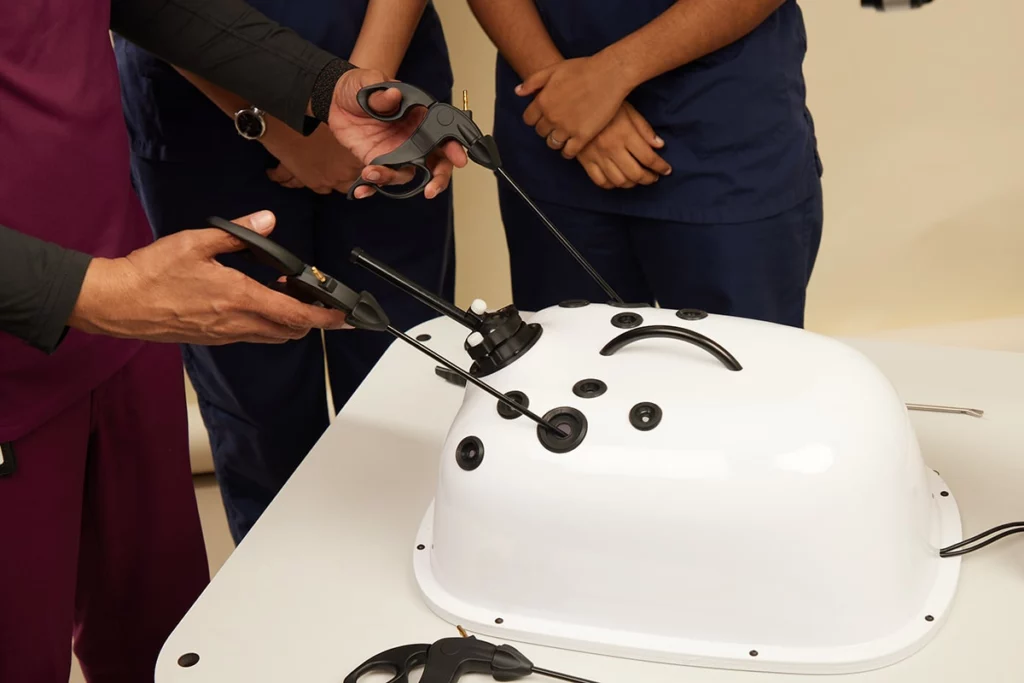
Learning Outcomes
- Apply proper laparoscopic ergonomics, trocar placement strategies, and instrument manoeuvring to enhance surgical efficiency and reduce fatigue.
- Enhance skills in performing Sleeve Gastrectomy, One-Anastomosis Gastric Bypass (OAGB), and Roux-en-Y Gastric Bypass (RYGB) using minimal access techniques.
- Demonstrate proficiency in intracorporeal knotting, endo loop placement, stapling techniques, and enterotomy closure to ensure secure and effective anastomoses.
- Identify and manage technical difficulties such as inadequate stapling, bleeding, and anastomotic leaks to improve patient outcomes.
Description
This three-day intensive course is designed for surgeons aiming to advance their expertise in minimal access bariatric surgery. Combining theoretical knowledge with hands-on practice, the program focuses on refining surgical techniques, enhancing clinical decision-making, and effectively managing complications. In addition to live surgical demonstrations, panel discussions, and simulation-based training, participants will receive access to a comprehensive Learning Management System (LMS) with 20 in-depth modules to strengthen conceptual understanding and reinforce key principles of bariatric surgery
New Batch Starts on
Contact Us
Course Duration:
3 Days
 Webinars, panel and small group discussion
Webinars, panel and small group discussion Dry lab training on technical aspects
Dry lab training on technical aspects Realistic 3D printed models
Realistic 3D printed models Live demonstrations/ master videos
Live demonstrations/ master videos
Curriculum
Knowledge
Delivered through online lectures
Skills
Delivered through 3-day contact course at Apollo Simulation Centre
Assessment
For both knowledge and skills
Observership
Optional
Online Course Module
All didactic lectures will be available as online modules for candidates 2 weeks prior to the contact course to prepare for the course well in advance. All the required theory knowledge will be learnt through web platform. There will be a Q&A section available after each lecture to interact with the faculty for any additional doubts to be clarified. Completing online modules is mandatory for certification
| S. No | Topic | Faculty | Comment |
|---|---|---|---|
| 1 | Introduction to laparoscopy | Dr. Prasanna Kumar | History and development |
| 2 | Laparoscopic instruments | Dr. Prem Balachandran | Image chain, lap trolley |
| 3 | Basic principles | Prof. Raj Palaniappan | Ergonomics of setup and access |
| 4 | Energy sources | Dr. Venkat Subraminaim | Electrosurgery, ultrasonics |
| 5 | Access techniques | Dr. Muralidharan | Pneumoperitoneum creation |
| 6 | Tissue approximation | Prof. Raj Palaniappan | Suturing, staplers, glue |
| 7 | Equipment maintenance | Dr. Nikhilesh Krishna | Safety, sterilisation, storage |
| 8 | Anaesthetic considerations | Dr. Elayaraja S.M. | ERAS, specific considerations |
| 9 | Troubleshooting | Prof. Raj Palaniappan | Tips to overcome difficulties |
| 10 | Robotic surgery | Dr. Venki Munikrishnan | Benefits, modifications |
| 11 | Bariatric anatomy and physiology | Prof. Raj Palaniappan | Surgical relations and mechanism |
| 12 | Optimising patient for surgery | Dr. Nikhilesh Krishna | Assessments, pre-op preparation |
| 13 | Restrictive surgeries | Dr. Jameel JKA | Band, sleeve principles, outcome |
| 14 | Malabsorptive/metabolic | Dr. Arun Prasad | RYGB, OAGB, DJB, SADI, etc. |
| 15 | Bariatric nutrition | Mr. Sowmiyan Seshadri | Deficiencies, supplements |
| 16 | Post-operative Care | Dr. Nikhilesh Krishna | Follow-up and support group |
| 17 | Complications | Dr. Saurabh Mishra | Modalities to overcome difficulties |
| 18 | Recent Advances | Dr. Arun Prasad | Principles, surgeries, instruments |
| 19 | Failure/weight regain | Prof. Raj Palaniappan | Management |
| 20 | Setting up of a bariatric unit | Dr. Nikhilesh Krishna | Team, OT and protocols |
Contact Course
The three-day contact course is aimed at providing practical knowledge about everything that one needs to know about minimal access hernia surgery. This is achieved by way of 50% of time spent on panel discussions, live surgical demonstrations and 50% time on hands on training including dry and simulation laboratory.
| Time | Event | Location | Comment |
|---|---|---|---|
| 08:45 | Registration and pairing | Lounge | Welcoming of participants |
| 09:00 | D1: Bariatric trolley | EndoSuite | Image chain, lap trolley |
| 09:45 | D2: Basic principles | EndoSuite | Ergonomics of set-up and access |
| 10:30 | D3: Access techniques | EndoSuite | Creation of working space |
| 11:00 | Coffee/Tea – Lounge | ||
| 11:15 | H1: Access and dexterity | Skills Lab | Dissection and scissors exercise |
| 12:00 | H2: Knotting and clipping | Skills Lab | Technique and steps |
| 12:30 | Lunch – Lounge | ||
| 13:30 | P1: Right patient right surgery | Skills Lab | Advantages and disadvantages |
| 14:00 | P2: Procedure master videos | Skills lab | Tips and tricks |
| 15:00 | Coffee/Tea – Lounge | ||
| 15:15 | H3: Intracorporeal suturing | Skills lab | Endoloop, torn sac looping |
| 16:15 | H4: Stapling exercise | Skills lab | Needle handling, suturing |
| 16:45 | Summary | Lounge | Views, recap and group photo |
| 17:00 | End of Day 1 | ||
Day 2: ASC
| Time | Event | Location | Comment |
|---|---|---|---|
| 08:45 | Overview | Lounge | Pairing |
| 09:00 | H5: Omental dissection | Skills lab | Technique and steps |
| 09:45 | H6: Gastric stapling | Skills lab | Technique and steps |
| 11:00 | Coffee/Tea | ||
| 11:15 | H7: Stapled GJ | Skills lab | Technique, steps |
| 11:45 | H8: Enterotomy closure | Skills lab | Technique, steps |
| 12:30 | lunch | ||
| 13:30 | P3: Complications | Board room | Investigations and management |
| 14:00 | P4: Mishap videos | Board room | Complications, troubleshooting |
| 15:00 | Coffee/Tea | ||
| 15:15 | E1: OSE | Skills lab | Practical exam |
| 16:30 | E2: Results and certification | Skills lab | Analysis of performance |
| 16:45 | Summary and feedback | Lounge | Views and recap |
| 17:00 | End of Day 2 | ||
Day 3: ASC
| Time | Event | Location | Comment |
|---|---|---|---|
| 08:45 | Overview | OT lounge | Pairing |
| 09:00 | S1: Sleeve gastrectomy | OT | Technique, steps |
| 10:30 | Coffee/Tea | ||
| 11:00 | S2: OAGB | OT | Step-by-step approach |
| 12:30 | Lunch | ||
| 13:30 | S3: RYGB/SASJ/revision | OT | Step-by-step approach |
| 15:00 | Coffee/Tea | ||
| 16:30 | Summary | OT lounge | Views and feedbacks |
| 17:00 | End of the Course | ||
Observership program
Observership include short 3-day period of attachment with the respective speciality unit to witness live surgeries and ward rounds of various surgeries as per availability in the respective speciality.
Mentorship program
Mentorship involve a much longer 3-week period of clinical attachment to the speciality unit with possibilities of surgeon shadowing through managing outpatient/inpatient services and assisting procedures/surgeries.
Objective Assessment Module
Objective clinical assessment remains the most replicable and standardised scoring system to evaluate the candidates’ knowledge and skills. This is achieved through the following methods in aMAS Bariatric courses.
Multiple Choice Questions (MCQ)
Online lectures are assessed by way of Multiple Choice Questions at the end of each lectures. 10 random questions will be asked once the lecture is complete. The candidate will be appearing for the questions and should score 50% to move on to next lecture.
Objective Structured Clinical Examination (OSCE)
Skills and technique assessment will be done through OSCE at the end of the contact course. Each student will be performing various tasks like dissection, suturing, stapling, steps of bariatric procedures, etc. which we objectively assessed through scoring key. The number of stations will vary between 8 and 12. At the end of the examination, a cumulative score of 50% will be required to clear the assessment.
Patron
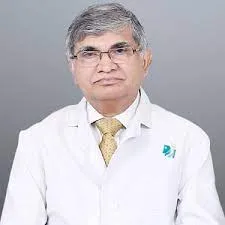
Dr. Prasanna Kumar Reddy
Sr. Consultant Surgeon,
Department of Surgical Gastroenterology,
Apollo Hospitals, Chennai
Program Director
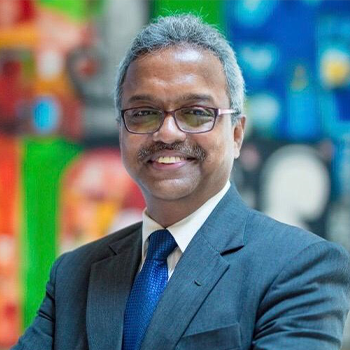
Dr. Muralidharan M
Consultant Surgeon,
Department of General Surgery,
Apollo Hospitals, Chennai
Course Convenor
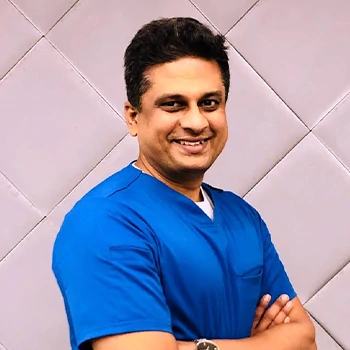
Dr. Raj Palaniappan
Director and Lead Surgeon,
Institute of Bariatrics,
Apollo Hospitals, Chennai
Faculty
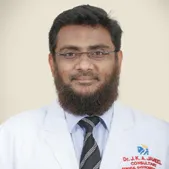
Dr. J.K.A. Jameel
Sr. Consultant,
Department of Surgical Gastro enterology
Apollo Hospitals, Chennai
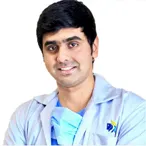
Dr. Nikhilesh Krishna
Consultant Surgeon,
Department of Minimal Access Surgery,
Apollo Hospitals, Chennai
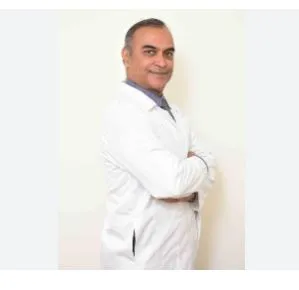
Dr. Arun prasad
Senior Consultant,
Surgical Gastro enterology
Department of Bariatric Surgery,
Indraprastha Apollo Hospital
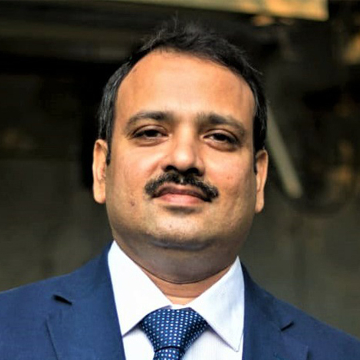
Dr. Sudeepta Kumar Swain
Consultant,
Robotic Gastrointestinal Surgeon,
Apollo Hospitals, Chennai
Who is this course for?
Minimal Access Surgeons
Why ASC
- Unparalleled Technological Infrastructure
- Expert Faculty with Real World Experience
- Innovative Learning Methodologies
- Comprehensive Curriculum
- Learner faculty ratio and learner manikin ratio is well maintained

